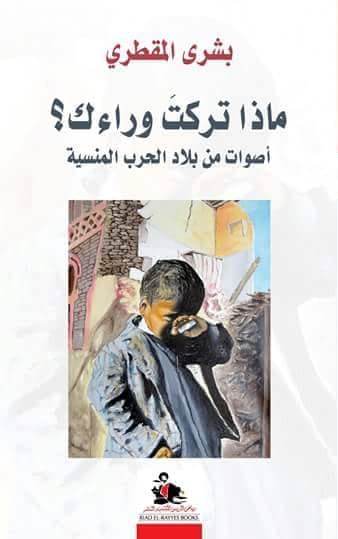Yemenʹs chronicles of death and destruction untold

When the war broke out in Yemen three years ago bringing death, destruction and devastation in its wake, Bushra al-Maqtari refused to desert her beleaguered homeland.
An activist-writer and novelist from Taiz, al-Maqtari opted to stay back and travel across the length and breadth of Yemen to capture the trials and tribulations of her fellow countrymen, caught up in a war inflicted on them by two competing regional powers, hell bent on punching a hole in each otherʹs sphere of influence. She visited the families of war victims and chronicled the tragic stories of their nearest and dearest, who were either killed or maimed in brutal bombing, indiscriminate shelling and missile attacks.
In her book "What you left behind? Voices from a forgotten war-torn country", published to date in Arabic by Beirut-based Riad El-Rayyes, al-Maqtari is less concerned with narrating the chronological facts and figures or the political undercurrents of the war; what bothers her instead are the civilian casualties. She makes the victims of the war, those who are bearing the brunt of it, the focus of the book. Replete with the gory tales of those who were killed, wounded, widowed, orphaned or displaced by the war, the book is neither for the faint-hearted nor for those looking to wallow in statistics.
Giving a voice to the victims
She employs the same narrative technique as that of her 2012 novel "Behind the Sun", which dealt with the issues of forced disappearance in Yemen. "What you left behind?" talks about the dead and the misplaced through the voices and memories of those who are still alive. After a brief introductory chapter, the narrator in al-Maqtari takes a back seat, leaving the victims to give vent to their desperate plight.

Ordinary people are the eternal losers in any war. They live in a state of perpetual fear, yet remain the most forgotten. The torture and pain they suffer is reduced to data and figures of purely statistical importance – de-personalised to the mere numbers of those who were killed, wounded or displaced, perhaps more useful to those who looking to profit from the war.
The distressing accounts in "What you left behind?" begins with the tragic stories of the war victims in Sanaʹa. She writes that there are instances where one literally feels the stench of burning human flesh lingering in oneʹs nostrils for days. The description of burned human hairs getting stuck on the floor of a food plant in the aftermath of an attack by the Saudi-led Arab alliance, will move you to tears even days after reading the book.
A risky undertaking
The situation is more dreadful when it comes to the south-western city of Taiz, al-Maqtariʹs hometown besieged by Houthis. Taiz is a scene of destruction and wreckage, littered with destroyed houses and filthy transit camps inhabited by people who were ousted by the militias from their villages. One can read the dread in the eyes of people who took refuge in difficult mountainous passes to sit out the siege.
As a journalist from northern Yemen, it was not easy for al-Maqtari to visit many parts of the south, the majority of which is now actually controlled by UAE forces. She was once arrested at the entrance to Dhala and had to obtain official approval from UAE officials to proceed.
The port city of Hodeidah on the Red Sea was the riskiest and one of the most challenging legs of her visit to the war-torn areas. As militias were arresting journalists trying to enter the city, al-Maqtari hoodwinked them by wearing a traditional Yemeni pullover and covering her face. Luckily for her, the militias did not venture to uncover the faces of each female traveller to inspect them closely. She visited a couple of hospitals in Hodeidah filled with the victims of military assaults and saw people who were fatally wounded by cluster bombs.
Al-Maqtari dedicates the last portion of the book to her friend Reham Badr who was very close to her throughout the writing of the book but could not wait till it was published. She and her friend Mamoun al-Sharabi were killed in a Houthi shelling in the eastern part of Taiz, while distributing relief to the besieged families.
Too many ʹcollateral mistakesʹ
The ʹcollateral mistakeʹ of bombing civilian targets is nothing unusual in Yemen. One of such places was Al Huraidha where there were no barracks, patrols or military camp. There were only a few houses inhabited by poor people, a car workshop and a popular market. "We were trying to live safely; but they came and bombed the place. They killed my brotherʹs family," Al-Maqtari quotes Ahmed Abdul Hamid, a resident of Al Huraidha.
When Abdul Hamid entered the house after the bombardment, he saw mutilated human bodies lying everywhere. Nusseibeh Abdul Malik tells her story about the Houthi and Saleh militias in the city of Taiz. A shrapnel attack killed her daughter Reem and nine other people, and severely wounded her eight-year-old daughter Malak who was playing with her friends. Sabah Ahmed Fari from Sanaʹa lost her 19-year-old daughter Noura, five-year old son Shihab, two friends of her daughter, as well as some of her neighbours.
Al-Maqtariʹs chronicling of these actual sufferings salvage them from being consigned to oblivion. She envisions these heartrending anecdotes, reminding posterity about the danger, folly and futility of war, regardless of the false and flimsiest pretexts on which it was waged. When the fury of the war subsides and the regional rivals agree to a truce and foreign companies are invited to reconstruct the country with lucrative projects, we will have these tear-jerking stories to remind us about the sheer idiocy, vainglory and heartless cruelty that is the war in Yemen.
Muhammed Nafih Wafy
© Qantara 2018
Muhammed Nafih Wafy is a journalist and writer currently based in Muscat, Oman. He is the author of "The book of aphorisms: Being a translation of Kitab al-Hikam".
